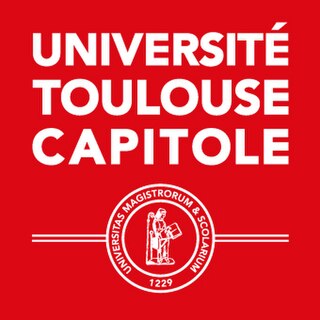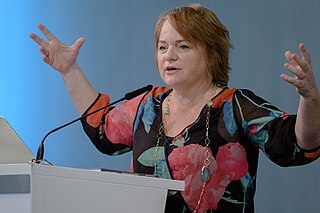The European Master of Public Administration Consortium (EMPA) is a network of European schools offering leading master's programs in public administration. Established in 1990-1991, it has developed one of the first multilateral exchange programs for students and scholars of public administration, and issues a joint diploma upon completion of the program. [1]

Sciences Po or Sciences Po Paris, also known as the Paris Institute of Political Studies, is a private and public research university located in Paris, France, that holds the status of grande école and the legal status of grand établissement. The university's undergraduate program is taught on the Paris campus as well as on the decentralized campuses in Dijon, Le Havre, Menton, Nancy, Poitiers and Reims, each with their own academic program focused on a geopolitical part of the world. While Sciences Po historically specialized in political science, it progressively expanded to other social sciences such as economics, law and sociology.

The Institut d'Etudes Politiques de Rennes also known as Sciences Po Rennes, is a French university established in 1991 in Rennes, the regional capital of Brittany. The institution is one of 10 political science institutes in France and is considered one of the grandes écoles.
Instituts d'études politiques, or IEPs, colloqually referred to as Sciences Po, are ten publicly owned institutions of higher learning in France. They are located in Aix-en-Provence, Bordeaux, Grenoble, Lille, Lyon, Paris, Rennes, Strasbourg and Toulouse, and since 2014 Saint-Germain-en-Laye. Their vocation is the study and research of contemporary political science. All students at the IEPs study a curriculum that is highly practical and broad-based, focusing on the full range of the social sciences across law, economics, finance, and management. These schools are considered as some of the most selective in France, mainly because they are the place where many political and business leaders are trained.

Sciences Po Strasbourg - Institut d'Etudes Politiques de Strasbourg is a Grande école located in Strasbourg, France. It was founded on 9 October 1945, with the IEP Paris . Since 1 January 2009, it is part of University of Strasbourg, the second largest university in France. Its current director is Jean-Philippe Heurtin. In 2024, Sciences Po Strasbourg was ranked 2nd of French schools of political science by Studiesadvisor.

Sciences Po Aix, also referred to as Institut d'Études Politiques (IEP) d'Aix-en-Provence, is a Grande École of political studies located in Aix-en-Provence, in the South of France. It is associated with Aix-Marseille University and is part of a network of ten Institut d'études politiques, known as IEP.

Institut d'études politiques de Bordeaux, also known as Sciences Po Bordeaux, is a French grande école located on the university campus of Pessac, Bordeaux. It is attached to the University of Bordeaux. Established in 1948, Sciences Po Bordeaux is one of the ten Institutes of Political Studies in France.
The Grenoble Institute of Political Studies, also known as Sciences Po Grenoble, is a French "grande école" of political science and more broadly of social sciences located in the campus of the University of Grenoble in Grenoble, France. It is administratively a subsidiary of the Université Grenoble Alpes.
Sciences Po Toulouse, or the Institut d'études politiques de Toulouse is one of the nine Institutes of Political Studies of France. Based in the center of Toulouse, France, next to the Université Toulouse 1 Capitole, this highly selective political science grande école was founded by a Decree in 1948 under the name of Institut d'études politiques de l'université de Toulouse. Since 2004 the courses have been 5 years long.
The Institut d'Études politiques de Lyon also known as Sciences Po Lyon, is a grande école located in Lyon, France. It is one of ten Institutes of Political Studies in France, and was established in 1948 by Charles de Gaulle's provisional government following the model of the École Libre des Sciences Politiques. It is located at the Centre Berthelot within the buildings of a former military health college and operates as an autonomous institution within the University of Lyon. It is the first Institute of Political Studies to have joined the prestigious Conférence des Grandes écoles.

The Lille 2 University of Health and Law was a French university for health, sports, management and law. It was located in Lille and was part of the Community of Universities and Institutions (COMUE) Lille Nord de France.

Toulouse Capitole University is a public university in Toulouse, France. It is one of the three universities of the city of Toulouse, in southwestern France. The university, presided by Hugues Kenfack, focuses on social sciences, law, political science, economics and administration. An active member of the federal University of Toulouse, it became an experimental public institution on January 1, 2023.

A public policy school or school of public affairs is typically a university program, institution, or professional school of public policy, public administration, political science, international relations, security studies, management, urban planning, urban studies, intelligence studies, global studies, emergency management, public affairs, nonprofit management, criminology, and the sociology of law.

The École du Louvre is a selective institution of higher education and prestigious grande école located in the Aile de Flore of the Louvre Palace in Paris, France. It is dedicated to the study of archaeology, art history, anthropology and epigraphy.

The Hertie School is a German private, independent graduate school for governance located in Berlin. Hertie School is accredited to confer master's and doctoral degrees. Half of the school's students are international, with more than 95 countries represented among alumni and currently enrolled students. The working language is English.
French university associations known as "pôles de recherche et d'enseignement supérieur" were a form of higher-level organization for universities and other institutions established by French law in effect from 2007 to 2013. The 2013 Law on Higher Education and Research (France) discontinued the PRES; these have been largely replaced by the new Communities of Universities and Institutions. The list below indicates the status of those institutions designated as PRES or related associations before the 2013 law took effect. See the list of public universities in France for the current status of these institutions.

Kalypso Aude Nicolaïdis is a Franco-Greek academic, currently Professor of International Relations and Director of the Center for International Studies at Oxford University, England. She teaches in the areas of European integration, international relations, international political economy, negotiation and game theory and research methods as University Lecturer in the Department of Politics and International Relations. In 2020, Nicolaïdis joined the School of Transnational Governance at the European University Institute as a full time professor.
Columbia Global Centers are research outposts established by Columbia University in different locations around the world, as part of its initiative to further establish an international research university. The first of these centers opened in March 2009 in Beijing, China, and Amman, Jordan, and Columbia opened facilities in Paris, France, and Mumbai, India, in March 2010 and Istanbul, Turkey in November 2011. Locations in Nairobi, Rio de Janeiro and Santiago de Chile were opened in 2012 and 2013. An additional location in Tunis opened in 2018.

The German University of Administrative Sciences Speyer, is a national graduate school for administrative sciences and public management located in Speyer, Rhineland-Palatinate, Germany. Founded in 1947 by the French occupational authorities as a grande école, today it is operated under the joint responsibility of both the Federal Republic (Bund) and all 16 German states (Länder). It runs four Master's programs, grants doctoral degrees and habilitations, offers a postgraduate certificate program, and administers programs of executive education. The school is a major training ground for German and international senior government officials. Noted alumni and faculty include former President of Germany Roman Herzog, Professor Niklas Luhmann; former Minister of Defence Christine Lambrecht, current Justice at the Federal Constitutional Court of Germany Heinrich Amadeus Wolff, former President of the Bundesbank Helmut Schlesinger, former Prosecutor General of Germany Alexander von Stahl, and CEO of BASF Jürgen Strube.
The Transatlantic Policy Consortium(TPC) is a network of 42 North America and European higher education institutions that conduct education, training, and research in the field of public policy and public administration. Its mission is to promote an ongoing dialogue of students and faculty and to conduct joint research on contemporary transatlantic public policy issues. Papers written for the consortium's colloquia are published in the Transatlantic Public Policy Series with LIT Publishers in Germany. Current co-chairmen are professors Charles F. Bonser of Indiana University School of Public and Environmental Affairs and Eberhard Bohne of the German University of Administrative Sciences Speyer.